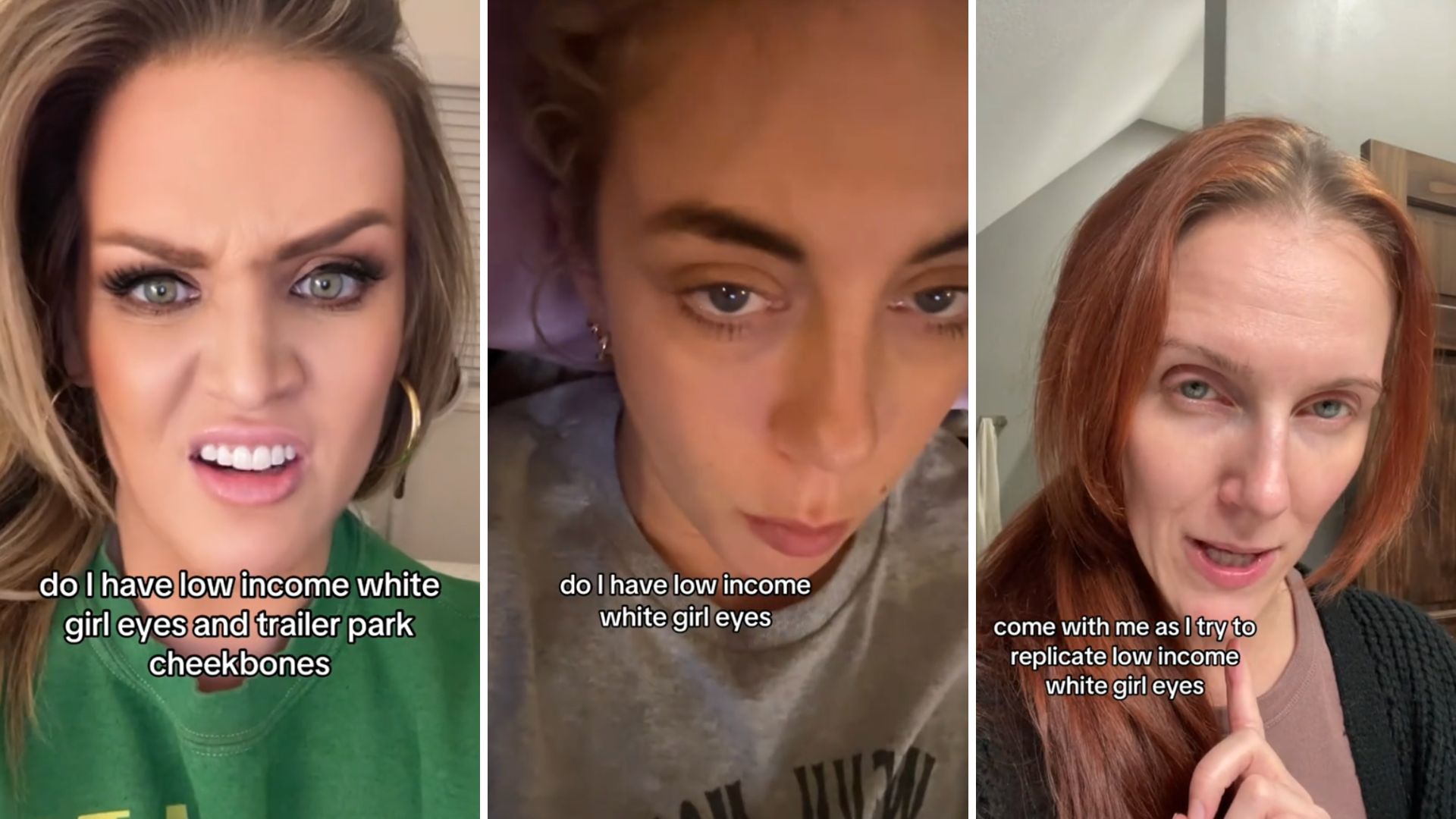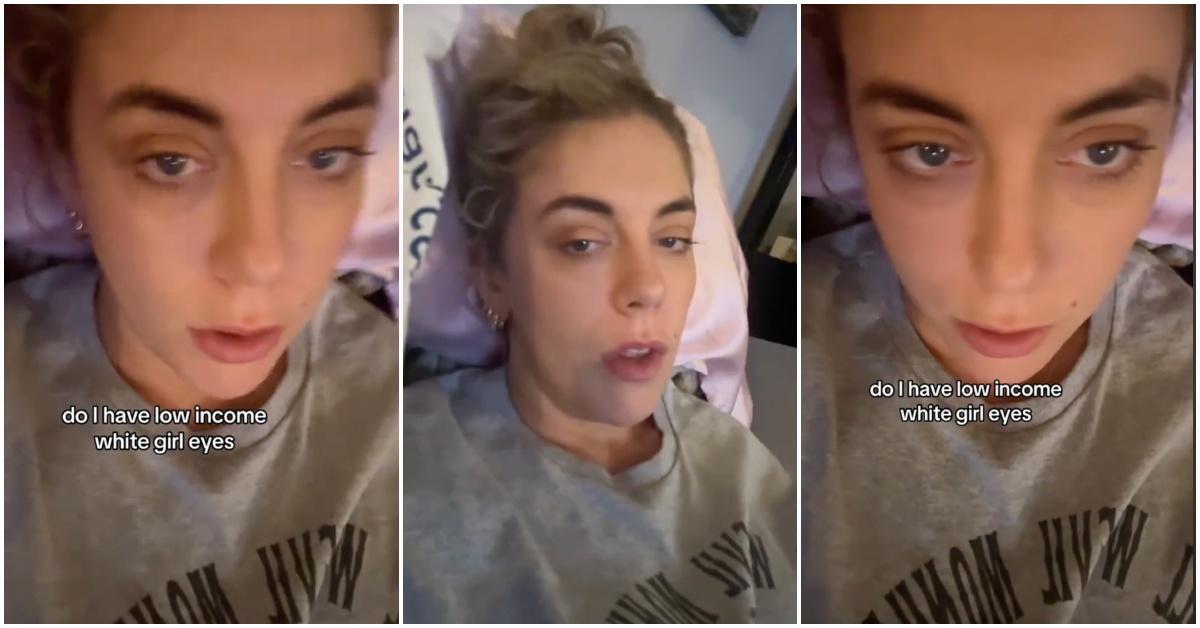The Quiet Strength: Looking At Low.income.white.girl.eyes And Economic Realities
Have you ever considered how a simple phrase, like low.income.white.girl.eyes, can spark so much thought? It's almost as if these words, when put together, hint at stories, at lives lived with certain conditions. This phrase, in a way, invites us to think about a part of our society that sometimes goes unnoticed, or perhaps isn't fully appreciated for its own unique experiences. It's a prompt, really, to consider the many different paths people walk, and what those journeys might mean for how they see the world around them.
When we hear the word "low," our minds might go to many places, right? My text, for example, tells us that "low" can mean something "situated, placed, or occurring not far above the ground, floor, or base." It also describes "low" as a "point or position, literally (as, a depth) or figuratively (as, a nadir, a time when things are at their worst, least, minimum, etc)." So, when we think about "low income," we're considering a situation where resources are, quite literally, "less than usual." This isn't just about money; it's about the everyday conditions that shape someone's life, the things that are "near the ground," perhaps, in terms of basic needs and opportunities.
This article aims to explore the broader implications behind a phrase like low.income.white.girl.eyes. We'll try to get a better grasp of what it might suggest about living with limited means, the resilience that often grows from such circumstances, and the ways we can all work to build a more understanding and supportive community. It's about looking beyond the surface, you know, and seeing the human spirit that shines through, even when things are, arguably, at their "minimum."
- Ofilmywap.linkmaz
- Vegamoviessi Your Ultimate Destination For Movie Streaming.linkmaz
- Jade Castrinos Drigs.linkmaz
- Sarah Kellen Epstein.linkmaz
- Bratty G Baby On Tiktok Onlyfans What You Need To Know.linkmaz
Table of Contents
- Understanding the Concept of Low Income
- The Everyday Experience of Limited Resources
- Resilience and Perspective from the Ground Up
- Fostering Understanding and Support
- Common Questions About Economic Hardship
- Moving Forward with Empathy
Understanding the Concept of Low Income
When we talk about "low income," it really means a situation where a person or a family has less money coming in than what's typically needed for a comfortable or even a basic life. My text explains "low" as something "not high," or "near the ground," and that's a good way to think about it. It means being in a position where daily needs, like food, shelter, and staying healthy, might take up a very large portion of whatever funds are available. This isn't just a number on a page; it’s a way of living that shapes many choices and possibilities, basically, every single day.
The implications of having "less than usual" resources can be quite broad, you see. It can affect everything from the kind of food people eat to the type of housing they live in. Sometimes, it means making tough choices between paying for a necessary medicine or putting food on the table. This state of "low" can, in a way, describe a household's financial standing, a point where things are, perhaps, at their "minimum" in terms of available funds for extras or even some necessities. It's a significant part of someone's overall life picture, and something that really matters to grasp.
It's important to remember that being in a low-income situation is not a choice, and it doesn't say anything about a person's worth or abilities. Instead, it often reflects larger economic conditions, job availability, and community support structures. My text mentions "a time when things are at their worst," and for many, a period of low income can certainly feel like that. However, it also highlights the human capacity to navigate these moments, showing a kind of quiet strength that often goes unacknowledged. We, as a society, have a role in making sure everyone has a fair shot, regardless of their starting point.
- Unveiling The Truth Blue Ivys Real Mother Cathy White.linkmaz
- Subhashree Sahu Season 2 Mms Video The Controversial Rise.linkmaz
- Cottontailva Of Leaks.linkmaz
- Russian Lathe Accident Full Video The Untold Story Behind The Scene.linkmaz
- Diva Flawless Porn Hot Videos Free Scenes Await.linkmaz
The Everyday Experience of Limited Resources
Living with "low" resources, as described by my text as "near the ground" or "less than usual," means a daily experience filled with unique challenges. It's not just about what you can't buy; it's about the constant calculations, the planning, and the sheer effort involved in making every penny stretch. You know, it's about finding ways to make ends meet when the usual pathways aren't quite open or are very, very limited. This reality shapes many aspects of life, from how families spend their time to the opportunities that feel within reach.
Navigating Financial Pressures
For individuals and families in low-income settings, financial pressure is a constant companion, so it is. My text describes "low" as a "nadir," a point where things are "at their worst," and this can certainly feel true when facing bills with very little money. Every decision, from buying groceries to paying for transport, becomes a careful balancing act. There's often a need to prioritize, perhaps choosing between a new pair of shoes for a growing child or fixing a small, but important, household item. These are the kinds of choices that people in more financially secure positions might not even think about, actually.
This daily struggle can also mean living in housing that is "not far above the ground" in terms of quality or location. It might mean relying on public transportation because a car is simply out of the question, or working multiple jobs just to cover basic expenses. The effort involved in simply staying afloat, in some respects, can be incredibly draining. It's a continuous process of managing scarcity, and finding creative solutions to common problems, which, you know, takes a lot of ingenuity and spirit.
Educational Paths and Future Hopes
Access to quality education and resources for learning can also be affected by a "low" income situation. While public schools are available to everyone, the extra support, such as tutoring, specialized programs, or even just quiet study spaces at home, might be "less than usual" for students from economically disadvantaged backgrounds. This isn't to say that talent or desire are lacking; quite the opposite, in fact. It's simply that the playing field, as it were, is not always level, by the way.
Yet, despite these hurdles, many young people from low-income homes show remarkable drive and determination. They often understand the value of education as a pathway to a better future, a way to move beyond the "low point" described in my text. Their aspirations are just as high as anyone else's, and their efforts to reach them, sometimes against considerable odds, are truly inspiring. It's a testament to the human spirit's ability to aim high, even when starting from a place that is "near the ground."
Resilience and Perspective from the Ground Up
One powerful outcome of facing "low" economic situations is the development of incredible resilience. My text defines "low" as a "nadir," a time when things are "at their worst," but it's often in these moments that people discover an inner strength they didn't know they possessed. This isn't about romanticizing hardship; it's about acknowledging the remarkable human capacity to adapt, to persevere, and to find solutions even when options seem very, very limited. People learn to be resourceful, to make do with what's available, and to appreciate small victories, so they do.
The perspective gained from living "near the ground," as my text puts it, is also quite unique. Those who have experienced economic hardship often have a deeper understanding of the value of community, mutual support, and the simple things in life. They might be more empathetic to others' struggles and possess a strong sense of gratitude for what they do have. This viewpoint, you know, can be a profound source of wisdom and a driving force for positive change, not just for themselves but for those around them, too it's almost.
This resilience isn't just about surviving; it's about thriving in a different way. It's about finding joy in simple moments, building strong bonds with family and friends, and developing a deep appreciation for hard work and perseverance. These are qualities that are, arguably, incredibly valuable in any walk of life, and they are often forged in the fires of adversity. It's a powerful reminder that strength comes in many forms, and not always from what's "high" or abundant.
Fostering Understanding and Support
To truly support individuals and communities experiencing "low" economic circumstances, we first need to cultivate a deeper understanding of their experiences. This means moving beyond stereotypes and recognizing the diverse realities within these groups. It means listening to their stories, learning about their challenges, and appreciating their strengths. As my text implies, "low" can be a "low point," but it's not the whole story of a person or a community, by the way. Understanding is the first step towards building real connections.
Providing meaningful support goes beyond just financial aid. It involves creating pathways to better opportunities, such as access to quality education, job training programs, and affordable healthcare. It means advocating for policies that help lift people out of poverty and ensure everyone has a fair chance to succeed. We can, you know, contribute to organizations that work directly with communities, or simply by being a good neighbor and offering a helping hand when it's needed. Learn more about community support initiatives on our site, as a matter of fact.
Encouraging positive representation in media and public discourse is also vital. When phrases like low.income.white.girl.eyes are used, it's important to consider the narrative they create. We should strive to tell stories that highlight resilience, intelligence, and the full spectrum of human experience, rather than perpetuating limiting portrayals. This helps to break down barriers and build a more inclusive society where everyone feels seen and valued, which is really important. We also have more information on this page about building inclusive communities.
Supporting local businesses in economically challenged areas can also make a big difference. When you spend money at a small shop or eat at a local restaurant, you're helping to keep jobs in the community and circulate money where it's most needed. It’s a direct way to contribute to the economic well-being of people who are working hard to build their lives, and that's something to think about, too it's almost. Every little bit helps to create a stronger foundation for everyone, helping to lift communities from a "low" economic position.
Furthermore, advocating for fair wages and equitable employment practices is a crucial step. Ensuring that people are paid a living wage for their work means they can better meet their basic needs and have a chance to save for the future. This reduces the number of individuals and families who find themselves in a "low" financial state, making it less likely that they'll reach a "nadir" where things are "at their worst." It's about creating a system where hard work truly pays off, and everyone has a fair shot at stability, basically.
Volunteering time and skills with organizations that assist low-income populations can also be incredibly impactful. Whether it's helping at a food bank, tutoring students, or providing professional mentorship, your efforts can directly improve someone's situation. These actions help to bridge gaps and provide resources that might otherwise be "less than usual" for those who need them most. It's a very personal way to contribute to positive change, and it often creates a strong sense of connection between people, you know.
Promoting financial literacy and education within communities is another key area. Giving people the tools and knowledge to manage their money, save for emergencies, and make informed financial decisions can empower them to improve their economic standing. This kind of education can help prevent people from falling into a "low point" financially and equip them with the skills to build a more secure future. It's about providing the groundwork, the "base," for greater financial stability, which is really quite important.
Supporting initiatives that address systemic issues, such as affordable housing and access to healthcare, is also essential. These are foundational elements that greatly impact a person's ability to escape a "low" income situation. When these basic needs are met, individuals and families are better able to focus on education, employment, and personal growth. It's about ensuring that the "ground" beneath people is stable and supportive, rather than constantly shifting, which can be very, very challenging.
Finally, simply practicing empathy and understanding in daily interactions can make a world of difference. Recognizing that everyone carries their own set of experiences and challenges helps us to treat each other with greater kindness and respect. This personal approach helps to break down preconceived notions and fosters a more compassionate society, where a phrase like low.income.white.girl.eyes is seen not as a label, but as a reminder of the rich and varied human stories that exist all around us, in some respects.
Common Questions About Economic Hardship
What are the common challenges for youth in low-income settings?
Young people in low-income settings often face challenges like limited access to educational resources, a lack of safe spaces for recreation, and sometimes, less healthy food options. They might also feel pressure to contribute to family finances at an early age, which can affect their schooling. My text describes "low" as "near the ground," and for these young people, it can mean dealing with very basic needs before anything else, so it does.
How does economic background shape a person's outlook?
A person's economic background can significantly shape their outlook by teaching them resilience and resourcefulness. Those who grow up with "less than usual" resources often learn to be very adaptable and appreciate what they have. They might develop a strong sense of community and a deep understanding of the value of hard work. This perspective can, you know, lead to a very grounded and practical view of the world, even if it comes from experiencing a "low point."
Where can one find resources for overcoming financial hardship?
Many places offer help for overcoming financial hardship. Community centers, local non-profits, and government agencies often have programs for food assistance, housing support, job training, and educational grants. Libraries can also provide free access to computers and learning materials. It's about looking for support that helps lift people from a "low" position, offering them tools to build a more secure future, basically. A good starting point could be to look for local social service organizations in your area, for example.
For more detailed information on economic conditions and their impact, you might find resources from the U.S. Census Bureau quite helpful. They provide data and reports that shed light on income and poverty levels, offering a broader picture of these societal situations.
Moving Forward with Empathy
Thinking about phrases like low.income.white.girl.eyes, and the underlying realities they might point to, is a step towards greater empathy. It's about recognizing the quiet strength and everyday struggles that exist, often unseen, in our communities. My text reminds us that "low" can mean a "time when things are at their worst," but it also implies a starting point, a foundation from which growth and change can happen. By fostering understanding and offering support, we can help ensure that every person, regardless of their economic situation, has the chance to thrive and share their unique gifts with the world, you know. It's a shared responsibility to build a society where everyone feels valued and has opportunities to reach their full potential, which is really what it's all about.
- Lisa Bessette.linkmaz
- Xnxx.linkmaz
- Lacy Kim Onlyfans Leak The Truth Behind The Controversy.linkmaz
- Ryan Paevey Wife.linkmaz
- Exploring The Controversial Topic Of Diva Flawless Sex Nude A Comprehensive Analysis.linkmaz

Trailer Park Cheekbones & Low-Income White Girl Eyes Explained - Betches

What Does Low Income White Girl Eyes Mean on TikTok? Explainer

What Does Low Income White Girl Eyes Mean on TikTok? Explainer